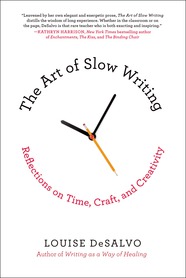
The Art of Slow Writing: Reflections on Time, Craft, and Creativity has some good information for writers, both those new to the craft and those who have been around for a page or two. The message being that it is OK to take your time with a project, and although its focus is more on writing a book, its suggestions apply to shorter pieces as well. And, really, to artists of any kind.
The author, Louise DeSalvo, breaks the books into sections addressing in turn Getting Ready to Write; A Writer's Apprenticeship; Challenges and Successes; Writers at Rest; Building a Book, Finishing a Book; and, Beginning Again. Each section contains an introduction and about ten essays.
She draws on her own writing experiences which I found engaging. She has plenty of experience to draw on. She has written ten books and edited quite a few others, started the Hunter College MFA in memoir program, and has studied and written extensively on Virginia Woolf.
She also offers quotes from other writers about how their writing process works. And herein lies the problem. So many of the quoted wisdom appears in the form of just one or two words within a sentence: "messy desk", "darkness and despair", "fruitful imitation". Open to almost any page and you will be faced with a barrage of quotation marks. I found it to be very annoying.
Also, the fact that she uses as sources interviews and articles published online by others is perhaps why these quotes are so ambiguous. I also found her use of such sources to be problematic. Ms. DeSalvo writes a blog and many of the chapters, she admits, came from essays posted there although they were "substantially revised" so maybe she used these sources for those posts.
There was also a lot of repetition in introducing a "guest" writer (see how annoying those quotation marks get?) in chapters throughout the book although I suppose if one is jumping around within the sections that might prove to be helpful. As I read the book straight through I got a little tired of reading over and over again what books quoted authors had written.
That said, I did glean some insights from the book. Even though her process pertains to writing longer fiction or non-fiction, I found myself identifying with the trials and tribulations in writing the shorter journalistic pieces and essays that I create.
I liked the final section on Building a Book, Finishing a Book with its chapters on making choices about what to leave in and what to take out of a piece. Working to untie the knots in the narrative. The constant revisions and finally the just letting go so, as she quotes William Faulkner, "I could finally have some peace with it." Then, the elation that comes with a finished piece of writing - no matter how long - and the subsequent "Now what?"
She mentions quite a few non-fiction books in the text and I made note of six that I want to follow up with. The internet sources that she used are listed in the back as well so the reader can always go directly to the online interview with, as she writes, a "real" writer. (Her quotation marks.)
All in all, I found the message of The Art of Slow Writing to be valuable in an age when we all seem to be so task and completion oriented. I don't think I have the stamina to attempt a long project such as a novel or memoir, but if I ever do get the itch, I will know that it is OK to slowly scratch it.
No comments:
Post a Comment